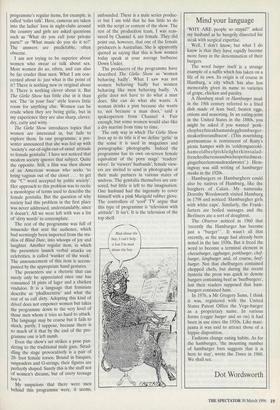Mind your language
'WHY ARE people so stupid?' asked my husband as he hungrily dissected his steak with surgical expertise.
Well, I don't know, but what I do know is that they have rapidly become more fussy in the denomination of their burgers.
The word burger itself is a strange example of a suffix which has taken on a life of its own. Its origin is of course in Hamburg, a city which has also less memorably given its name to varieties of grape, chicken and parsley.
A Hamburg steak or Hamburger steak in the 19th century referred to a fried dish made of lean beef, beaten eggs, onions and seasoning. In an eating-joint in the United States in the 1880s, you might be asked if you wanted 'pork- chopbeefsteakhamandegghamburger- steakorliverandbacon'. (This nourishing portmanteau is reminiscent of Ratty's picnic hamper with its `coldtonguecold- hamcoldbeefpickledgherkinssalad- frenchrollscresssandwichespottedmeat- gingerbeerlemonadesodawater'.) Hem- ingway was still writing of hamburger steaks in the 1920s.
Hamburgers or Hamburghers could also be natives of Hamburg, like the burghers of Calais. My namesake Dorothy Wordsworth visited Hamburg in 1798 and noticed `Hamburgher girls with white caps'. Similarly, the Frank- furters ate boiled sausages and the Berliners ate a sort of doughnut.
The Observer noticed in 1960 that 'recently the Hamburger has become just a "burger" ' . It wasn't all that recently, as the usage had already been noted in the late 1930s. But it freed the word to become a terminal element in cheeseburger, eggburger, porkburger, chef- burger, kingburger and, of course, beef- burger. Not that chefburgers contained chopped chefs, but during the recent hysteria the press was quick to denote burgers containing beef as 'beefburgers', lest their readers supposed that ham- burgers contained ham.
In 1976, a Mr Gregory Sams, I think it was, registered with the United States Patent Office the Vege-burger as a proprietary name. In various forms (veggie burger and so on) it had been in use since the 1950s. Like mari- juana it was said to attract those of a hippie disposition.
Fashions change eating habits. As for the hamburger, 'the mounting number of hamburger bars suggests that it is here to stay', wrote the Times in 1960. We shall see.
Dot Wordsworth


























































 Previous page
Previous page